Pop-Tarts
Pop-Tarts is a brand of toaster pastries that the Kellogg Company introduced in 1964. Pop-Tarts have a sugary filling sealed inside two layers of thin, rectangular pastry crust. Most varieties are also frosted. Although sold pre-cooked, they are designed to be warmed inside a toaster or microwave oven. They are usually sold in pairs inside Mylar (previously foil) packages and do not require refrigeration.
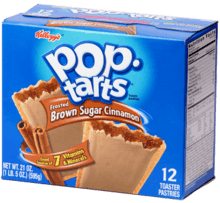 | |
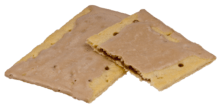 | |
| Product type | Toaster pastry |
|---|---|
| Owner | Kellogg Company |
| Country | United States |
| Introduced | 1964 |
| Markets | US, Canada, UK, Ireland, Australia, New Zealand, the Philippines |
| Website | www |
Pop-Tarts is Kellogg's most popular brand to date in the United States, with millions of units sold each year.[1] They are distributed mainly in the United States, but also in Canada, the United Kingdom, Ireland, and New Zealand. Pop-Tarts were discontinued in Australia in 2005 and brought back in 2014 with two flavors: Strawberry Sensation and Chocotastic.[2]
Pop-Tarts are produced in dozens of flavors, plus various one-time, seasonal, and "limited edition" flavors that appear for a short time.[3]
History
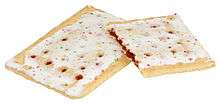
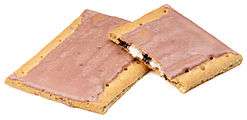
In the 1960s, Post adapted its process for enclosing food in foil to keep it fresh without spoiling—first used for dog food—to its new toaster-prepared breakfast food. Intended to complement its cold cereals, Post announced its new product to the press in 1963 before they went to market. Post called them "Country Squares".[4]
Because Post had revealed Country Squares before they were ready to be put in the marketplace, Post's biggest competitor, Kellogg, was able to develop its own version in six months. The product, advertised by an animated, anthropomorphic toaster named Milton, became so popular that Kellogg could not keep up with demand.[5]
Originally not frosted when first introduced in 1964,[6] it was later determined that frosting could withstand the toaster, and the first frosted Pop-Tarts were officially released in 1967. The first Pop-Tarts came out in four different flavors: strawberry, blueberry, brown sugar cinnamon, and apple currant.[5] As of 2016, there is a wide variety of Pop-Tart flavors, including hot fudge sundae, s'mores, raspberry, and peanut butter.
In 1992, Thomas Nangle filed a lawsuit, suing Kellogg for damages after his Pop-Tart became stuck in his toaster and caught fire. The case gained wider notoriety when humor columnist Dave Barry wrote a column about starting a fire in his own toaster with Pop-Tarts.[7][8] In 1994, Texas A&M University Corpus Christi professor Patrick Michaud performed an experiment showing that when left in the toaster too long, strawberry Pop-Tarts could produce flames to about 1.5 ft (46 cm) high.[9] The discovery triggered a flurry of lawsuits. Since then, Pop-Tarts carry the warning: "Due to possible risk of fire, never leave your toasting appliance or microwave unattended."
Pop-Tarts were introduced with fairly substantial marketing to the United Kingdom in the early 1990s. Chocotastic and Strawberry Sensation are available in most major UK supermarkets.[10]
In 2001, the United States' military airdropped 2.4 million Pop-Tarts in Afghanistan during the initial attack.[11]
In 2004, Pop-Tarts began a new advertising campaign, "Crazy Good".[12] Characters that appeared often were a singing lizard and a group of children, dubbed "crazy-good kids", who commonly frightened the Pop-Tarts and caused them to be eaten or chased away. The sound design and signature "TaDa" opening and closings were created by Kamen Entertainment Group, Inc. The ads employ squiggly animation, surrealist humor, and non sequitur, all of which bear a strong resemblance to the signature work of animator Don Hertzfeldt. One "crazy-good kid" in particular bears strong resemblance to Billy in Hertzfeldt's Billy's Balloon. However, Hertzfeldt was not involved in any way with these advertisements and in 2006 was considering possible litigation for stealing his work.[13]
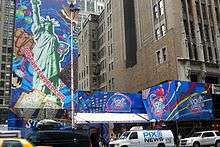
In 2010, a temporary Pop-Tarts store opened in New York City. It closed on December 31, 2010.
As of 2014, sales of Pop-Tarts had increased for 32 straight years.[14]
Related products
In the mid-1990s, Pop-Tarts introduced Pastry Swirls, which were more similar to competitor Pillsbury's Toaster Strudels. Pastry Swirls were bigger and thicker than regular Pop-Tarts. They had less icing. Flavors included Cherry Cheese Danish and Cinnamon Cream. Sales were disappointing, so the products were discontinued in 2001.
In 2002, Kellogg introduced Snak-Stix, a portable break-apart version intended as an after-school snack for children.[15] The new product was launched with a massive media tie in with the American Idol TV show and live tour. It did not sell well and was discontinued a year later.
Kellogg released "Ice Cream Shoppe" flavors of Pop-Tarts in 2005. These were ice cream related flavors such as hot fudge sundae but also featured 25% less sugar than standard Pop-Tarts. They were discontinued in 2012.
In 2006, Kellogg introduced a version of the product known as Go-Tarts. These were thicker, narrow, and wrapped individually (instead of in packages of two). Go-Tarts were discontinued in 2008.
Pop-Tarts Splitz were produced from 2007 to 2012. These featured two separate flavors in one pastry, split down the middle. Flavors included chocolate–vanilla and strawberry–blueberry.[16] Pop-Tarts Mini Crisps were introduced in 2011. They were a tiny, bite-sized version with no fruit filling, only flavored pastry with frosting. They were sold in single serving 60-calorie pouches. They are currently discontinued. In 2017, Pop-Tarts introduced three new flavors based on Jolly Rancher candies: green apple, cherry, and watermelon.[17]
Advertising
Industry trade groups have raised issues with Pop-Tarts advertising.
In 2003, the Produce for Better Health Foundation and the United Fresh Fruit and Vegetable Association told the Food and Drug Administration's Obesity Working Group that:
Efforts to capitalize on consumer demand for healthier foods has led to the on and off label promotion of products that contain relatively small amounts of fruits and vegetables and/or contain them as part of a product with unhealthy amounts of fat, sodium, or refined carbohydrates. These products, such as fruit drinks, pop tarts [sic], and highly sugared cereals, are more often energy dense than nutrient dense. FDA, working with the FTC, should strengthen its guidelines to prevent the promotion of products based on their fruit and vegetable content unless these products maintain the integrity of fruits and vegetables as healthy foods, and make a reasonable contribution to the recommended daily intake for fruits and vegetables.[18]
In 2006, the Children's Advertising Review Unit (CARU) of the Council of Better Business Bureaus, prompted by a customer complaint, "recommended that Kellogg modify packaging, eliminate the phrase 'made with real fruit'." Kellogg agreed to do so, and redesigned packages for the Pop-Tarts line accordingly; they assured CARU that the "claim does not appear on television or print advertising" and offered to "participate in CARU's self-regulatory process" and "take CARU's focus areas into consideration" as Kellogg proceeds with its "future child-directed advertising."[19] This decision has since been reversed and current boxes of Pop-Tarts continue to pronounce that the product is 'made with real fruit'.
Cable in the Classroom has used a Pop-Tarts television commercial as an example in its media literacy program for children.[20] They ask adults to watch a Pop-Tarts commercial with their children or students and "have them look at how much product information is presented and how much is really about lifestyle or attitude."[21]
Recalls
Pop-Tarts have been the subject of various recalls where mislabeling could lead to serious or life-threatening allergic reactions. In August 4, 1995: 94,500 cases of Smucker's Real Fruit Frosted Strawberry pastries actually contained the Chocolate Fudge variety.[22] In 2002, Kellogg alerted egg was an undeclared ingredient in its Frosted Brown Sugar Cinnamon Pop-Tarts.[23] In 2006, Kellogg Company alerted that Frosted Blueberry Pop-Tarts contained milk as an undeclared ingredient.[24]
See also
References
- "Kellogg Launches New Pop-Tarts Yogurt Blasts". investor.kelloggs.com (Press release). Kellogg Company. Archived from the original on December 3, 2008. Retrieved October 8, 2009.
- "Pop-Tarts". h2g2. BBC. March 6, 2007. Retrieved October 8, 2009.
- "Kellogs Pop-Tarts". Kelloggs Company. Archived from the original on July 25, 2014. Retrieved June 17, 2014.
- "Trivia — How long have we been munching on Pop-Tarts?". arcamax.com. ArcaMax Publishing. July 17, 2006. Retrieved October 8, 2009.
- "Nothing More Than Fillings: The True story of the Pop Tarts". Whole Pop Magazine. Archived from the original on March 4, 2016. Retrieved April 10, 2013.
- "Kellogg's(R) Pop-Tarts(R) Approaches 40th Anniversary With 'Design Your Own Pop-Tarts' Contest and Sweepstakes For Kids". kelloggcompany.com (Press release). Kellogg Company. January 21, 2004.
- Barry, Dave (June 27, 1993). "The Great Strawberry Pop-Tart Fire". Miami Herald. p. A12.
- Barry, Dave (June 1993). "Tarts Afire". davebarry.com.
- Michaud, Patrick R. (August 1994). "Strawberry Pop-Tart Blow-Torches". pmichaud.com. Retrieved April 10, 2013.
- "Pop Tarts: Products". Kelloggs.co.uk. Retrieved February 8, 2019.
- Colin, Chris; Pott, Carol (2006). The Blue Pages. Sausalito, California: PoliPointPress. p. 69. ISBN 0-9760621-1-9.
- "How Crazy Good Revitalized The Pop-Tarts Brand" (PDF). 2007. Archived from the original (PDF) on March 30, 2012. Retrieved October 8, 2009.
- "Killer Rabbit w/info on DARK CRYSTAL 2, PAN'S LABYRINTH, HELLBOY ANIMATED, CHOOSE YOUR OWN ADVENTURE & more!!!". Ain't It Cool News. July 27, 2006.
- Nassauer, Sarah. "Amid Kale and Quinoa, Pop-Tarts Keep Hanging On". Retrieved September 10, 2014.
- "Kellogg Introduces New Pop-Tarts Snak-Stix® Flavors" (Press release). November 4, 2002. Retrieved June 20, 2014.
- "Kellogg Introduces New Pop-Tarts Splitz" (Press release). Kellogg. July 25, 2007. Archived from the original on July 26, 2014. Retrieved June 25, 2014.
- Wang, Christine (May 16, 2017). "Jolly Rancher-flavored Pop-Tarts can be part of your complete, unhealthy breakfast". Mashable.com. Retrieved May 17, 2017.
- "Comments from the Produce for Better Health Foundation and United Fresh Fruit and Vegetable Association To FDA's Obesity Working Group". FDA.gov. US Food and Drug Administration. November 21, 2003. Archived from the original (Word document) on June 6, 2011. Retrieved May 9, 2020.
- "CARU Recommends Company Modify Packaging for Pop Tarts" (PDF). CARU.org (Press release). Children's Advertising Review Unit, Council of Better Business Bureaus. June 20, 2006. Archived from the original (PDF) on December 28, 2010.
- "Media Literacy 101: VI. Media Have Commercial Interests". ciconline.org. Cable in the Classroom.
- "Pop-Tarts Advertisement". ciconline.org. Cable in the Classroom.
- "Enforcement Report". FDA.gov. US Food and Drug Administration. January 3, 1996. Archived from the original on October 6, 2008. Retrieved April 9, 2009.
- "Kellogg USA Issues Allergy Alert on Undeclared Egg in Kellogg's® Pop-Tarts® Frosted Brown Sugar Cinnamon". FDA.gov. US Food and Drug Administration. Archived from the original on January 19, 2009. Retrieved October 8, 2009.
- "Kellogg Company Issues Allergy Alert on Undeclared Milk in Kellogg's Pop-Tarts Frosted Blueberry Toaster Pastries". FDA.gov (Press release). US Food and Drug Administration. Archived from the original on January 19, 2009. Retrieved October 8, 2009.
External links
| Wikimedia Commons has media related to Pop-Tarts. |
- Official website
- Pop-Tarts (UK)
- Pop-Tarts (Canada)
- Pop-Tarts (archived) on Kelloggs.com
_001.jpg)